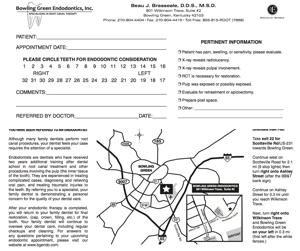Endodontic Surgery
Why would I need endodontic surgery?
- • Surgery can help save your tooth in a variety of situations
- • Surgery may be used in diagnosis. If you have persistent symptoms but no problems appear on your x-ray, your tooth may have a tiny fracture or canal that could not be detected during nonsurgical treatment. In such a case, surgery allows your endodontist to examine the entire root of your tooth, find the problem, and provide treatment.
- • Sometimes calcium deposits make a canal too narrow for the instruments used in nonsurgical root canal treatment to reach the end of the root. If your tooth has this “calcification,” your endodontist may perform endodontic surgery to clean and seal the remainder of the canal.
- • Usually, a tooth that has undergone a root canal can last the rest of your life and never need further endodontic treatment. However, in a few cases, a tooth may not heal or may become infected. A tooth may become painful or diseased months or even years after successful treatment. If this is true for you, surgery may help save your tooth.
- • Surgery may also be performed to treat damaged root surfaces or surrounding bone.
Although there are many surgical procedures that can be performed to save a tooth, the most common form of surgical retreatment is called apicoectomy with root-end filling. When inflammation or infection persists in the bony area around the end of your tooth after a root canal procedure, your tooth can still be saved with a surgical retreatment.

What is an apicoectomy?
In this procedure, the endodontist starts by making the area around the infected tooth profoundly numb. Then, the healthy gum tissue is temporarily moved out of the way to expose the underlying inflamed or infected tissue. This tissue is removed, and the tip of the root is prepared to accept a bioceramic root-end filling.

A small, bioceramic, root-end filling is then placed in the root to seal the end of the root canal, and a few stitches or sutures are placed in the gingiva to help the tissue heal properly.

Over a period of months, the bone heals around the end of the root.

Will the procedure hurt?
Local anesthetics will make sure you are very comfortable during the procedure. Some post-operative discomfort and slight swelling after surgical retreatment is normal, however your endodontist will prescribe and recommend appropriate pain medication and/or antibiotics to ensure you have a speedy and comfortable recovery.
Your endodontist will give you specific postoperative instructions to follow. If you have questions after your procedure, or if you have discomfort that lasts for more than a few days, please don’t hesitate to contact our office.
Can I drive myself home?
Often you can, but you should ask your endodontist before your appointment so that you can make transportation arrangements if necessary.
When can I return to my normal activities?
Most patients return to work or other routine activities the next day. Your endodontist will be happy to discuss your expected recovery time with you.
What are the alternatives to endodontic surgery?
Often, the only alternative to surgery is extraction of the tooth. The extracted tooth must then be replaced with an implant, bridge, or removable partial denture to restore chewing function and to prevent adjacent teeth from shifting. Because these alternatives require surgery or dental procedures on adjacent healthy teeth, endodontic surgery is usually the most biologic and cost-effective option for maintaining your oral health.
No matter how effective modern artificial tooth replacements are—and they can be very effective—nothing is as good as a natural tooth. You’ve already made an investment in saving your tooth. The pay-off for choosing endodontic surgery could be a healthy, functioning natural tooth for the rest of your life.

Leave a Reply